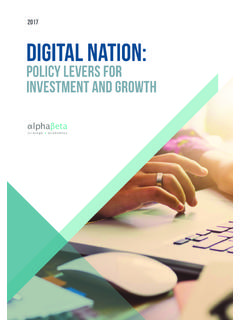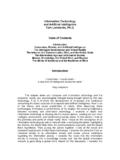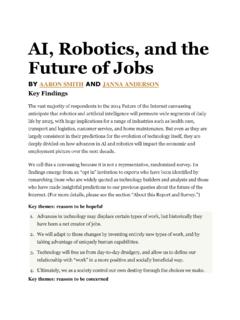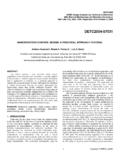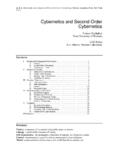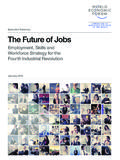Transcription of THE AUTOMATION ADVANTAGE - AlphaBeta
1 THE AUTOMATION ADVANTAGEHow Australia can seize a $2 trillion opportunity from AUTOMATION and create millions of safer, more meaningful and more valuable report was commissioned by Google and prepared by AlphaBeta . The information contained in the report has been obtained from third-party sources and proprietary research. All monetary figures reported are in 2015 real Australian dollar terms, unless otherwise is a strategy and economic advisory business serving clients across Australia and Asia from offices in Singapore and 7, 4 Martin PlaceSydney, NSW, 2000, AustraliaTel: +61 2 9221 4, 1 Upper Circular RoadSingapore, 058400 Tel.
2 +65 6443 transitioning the workforcefrom accelerating the rate of automationMachines will unburden the average Australian of2 HOURS$ TRILLION boost to Australia s national income between 2015 and 2030 from productivity gains50% fewer Australian firms are engaged in AUTOMATION compared to leading countries$1 TRILLION$ injuries will fall by 11% as dangerous manual tasks are automatedMORE SATISFYING62% of low-skilled workers will experience improved satisfactionMORE VALUABLEW ages for non-automatable work are 20% higher than for automatable workAutomation is changing the way we workAs AUTOMATION reduces routine and manual work, our jobs will currently lags global leaders in Automationof the most tedious and manual work a week over the next 15 yearsAutomation could deliver a45 EXECUTIVE SUMMARY61 AUTOMATION IS CHANGING THE WAY AUSTRALIANS the next 15 years, the average Australian worker will spend 2 hours per week less on manual and routine will change the jobs we do.
3 But it will mostly change the way we do our jobs122 AUTOMATION IS A $ TRILLION OPPORTUNITY FOR AUSTRALIA IF WE GET IT would gain $ trillion from transitioning workers affected by would gain $1 trillion by accelerating the rate of automation193 AUTOMATION WILL MAKE AUSTRALIAN JOBS SAFER, MORE SATISFYING AND MORE will become safer, as machines take over the most dangerous tasks at will become more satisfying, as machines take over the most routine tasks at will become more valuable, as machines take over the least productive tasks in the economy234 HOW AUTOMATION CAN BECOME A SUCCESS STORY IN should be tailored for different groups affected by from abroad: how other countries are responding to A: Estimating timeshares of tasks in the B: The impact of AUTOMATION on work C: Evaluating the potential gains from D: Evaluating the impact of AUTOMATION for different groups of workers42 CONTENTS6 EXECUTIVE SUMMARYT echnological change has long been a source of anxiety for workers.
4 Today, improvements in communication technology, robotics, and machine intelligence are rekindling age-old concerns that technology will soon force millions of people out of work. This report provides a fresh perspective. AUTOMATION is, at its core, an opportunity to harness the power of machines to improve human lives. If we get it right, AUTOMATION could significantly boost Australia s productivity and national income potentially adding up to trillion Australian dollars in value to our economy by 2030. But this opportunity will not land in Australia s lap.
5 To unlock the benefits of AUTOMATION we must be bold enough to lead changes. This means embracing technology s potential to make our workplaces more productive, while taking steps to prevent Australia s most vulnerable workers from sliding into unemployment. This report outlines how Australia can turn the trend of AUTOMATION into a national economic success story. To understand the impact of AUTOMATION on Australia s economy this report analyses how AUTOMATION changes the working life of every Australian. The use of machines is changing what jobs we do.
6 Strenuous physical jobs are disappearing on factory floors, and routine administrative jobs can increasingly be done without human workers. On the flipside, more jobs are being created in community, personal and business services, and other specialised professions that rely on uniquely human skills such as thinking creatively and being able to understand other people s emotions. However, more than changing what jobs we do, AUTOMATION is changing the way we do our jobs. This report gives a comprehensive picture of the impact of AUTOMATION on Australian workers by digging below the job level and analysing how technology is affecting the time that we spend on different work tasks within our jobs.
7 In detail: every one of the 20 billion hours that Australians worked last year was assigned to one of more than 2,000 work tasks, creating a complete picture of how much time Australians have spent on each work task over a 15-year period. The results provide remarkable insights and allow us to understand likely future work patterns. Technology is already changing the nature of human job tasks. For example, retail workers are spending less time ringing up items at the register and more time helping customers; bank employees are spending less time counting banknotes and more time giving financial advice; teachers are spending less time recording test scores and more time assisting students; factory workers are spending less time on the assembly line and more time optimising production and training other workers.
8 Over the long term, AUTOMATION technologies will be the primary engine of prosperity, lifting wages, living standards and work conditions. But in the short term, these same technologies present risks that must be the past 15 years alone, Australians have reduced the amount of time spent on physical and routine tasks by 2 hours each week. Most of that change isn t coming from the loss of physical and routine jobs. Rather, it comes from workers switching to different tasks within the same jobs, as machines take over an increasing load of the repetitive routine work.
9 AUTOMATION isn t a force we can stop. But Australia s economy has a lot to gain if we manage to avert the employment risks that come with growing machine use. To unlock the full amount of gains, two conditions need to be fulfilled:First, Australia requires a strong policy framework to ensure workers at risk of being displaced are redeployed. There is no reason why this should not be the case. History shows that past waves of technological disruption have ultimately led to increased prosperity, productivity and employment. Over centuries, machines have progressively replaced labour in agriculture, manufacturing, administration and professional services.
10 Yet, humans always find work to do partly because technology creates new opportunities for workers and partly because humans are infinitely capable of redefining what we mean by work. Today, there is a myriad of occupations that no one ever heard of a few decades ago: think of social media manager, software engineer, ride share driver, well-being coach, website builder or Zumba instructor. In response to the claim that robots will take all our jobs , economist Milton Friedman noted that human wants and needs are infinite, and so there will always be new industries, there will always be new professions.
